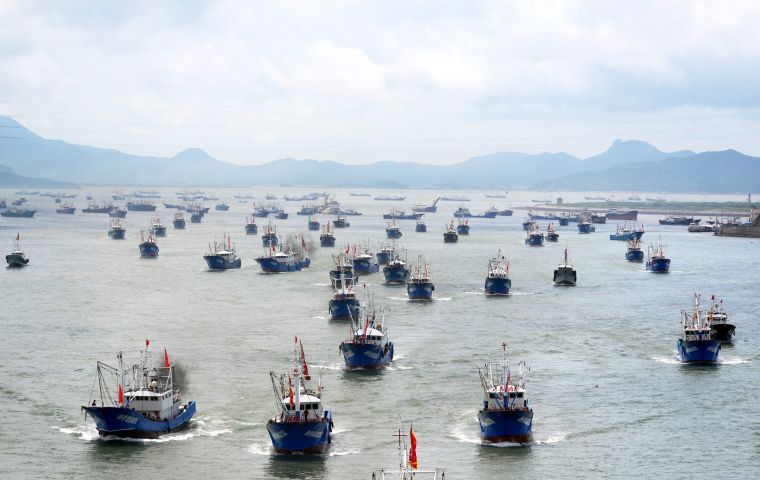MercoPress. South Atlantic News Agency
WTO edges closer to an agreement on fisheries limiting government subsidies
 FAO estimates that one-third of global fish stocks are overfished and most of the rest is fully exploited. This is up from 10% in 1970 and 27% in 2000
FAO estimates that one-third of global fish stocks are overfished and most of the rest is fully exploited. This is up from 10% in 1970 and 27% in 2000 The World Trade Organization edged closer on Thursday to an agreement that would set new rules for the global fisheries industry and limit government subsidies contributing to unsustainable fishing and the depletion of global fish stocks.
During an all-day meeting with 104 ministers and heads of delegation, WTO members pledged to conclude the negotiations soon and certainly before the WTO's Ministerial Conference in early December, and to empower their Geneva-based delegations to do so. Members also confirmed that the negotiating text currently before them can be used as the basis for the talks to strike the final deal.
“I feel new hope this evening. Because ministers and heads of delegation today demonstrated a strong commitment to moving forward and doing the hard work needed to get these negotiations to the finish line. I applaud you for this. In 20 years of negotiations, this is the closest we have ever come towards reaching an outcome – a high-quality outcome that would contribute to building a sustainable blue economy,” said Director-General Ngozi Okonjo-Iweala.
“One fundamental conclusion that I draw from your interventions today is that members are ready to use the text as the basis for future negotiations. A second takeaway from today was that there is universal agreement about the importance of the food and livelihood security of artisanal fishers in developing and least developed countries. The prospect for a deal in the autumn ahead of our Ministerial Conference has clearly improved.”
The UN Food and Agriculture Organization estimates that one-third of global fish stocks are overfished and most of the rest is fully exploited. This is up from 10% in 1970 and 27% in 2000. Depleted stocks threaten the food security of low-income coastal communities, and the livelihoods of poor and vulnerable fishers who must go further and further from shore only to bring back smaller and smaller hauls.
Each year, governments hand out around US$ 35 billion in fisheries subsidies, two-thirds of which go to commercial fishers. These subsidies keep at sea vessels which would otherwise be economically unviable. World leaders in 2015 made a fisheries subsidies agreement by 2020 part of the Sustainable Development Goals and trade ministers reaffirmed this pledge in 2017.
The negotiations on fisheries subsidies disciplines have been ongoing for nearly 20 years. Among the thorniest issues to resolve has been how to extend special and differential treatment to developing and least developed country WTO members while preserving the overall objective of enhanced sustainability of the oceans. Ministers said that the livelihoods and food security of poor and vulnerable artisanal fishers in developing and least developed countries were of great importance, as was preserving the sustainability objective of the negotiations.




Top Comments
Disclaimer & comment rulesCommenting for this story is now closed.
If you have a Facebook account, become a fan and comment on our Facebook Page!